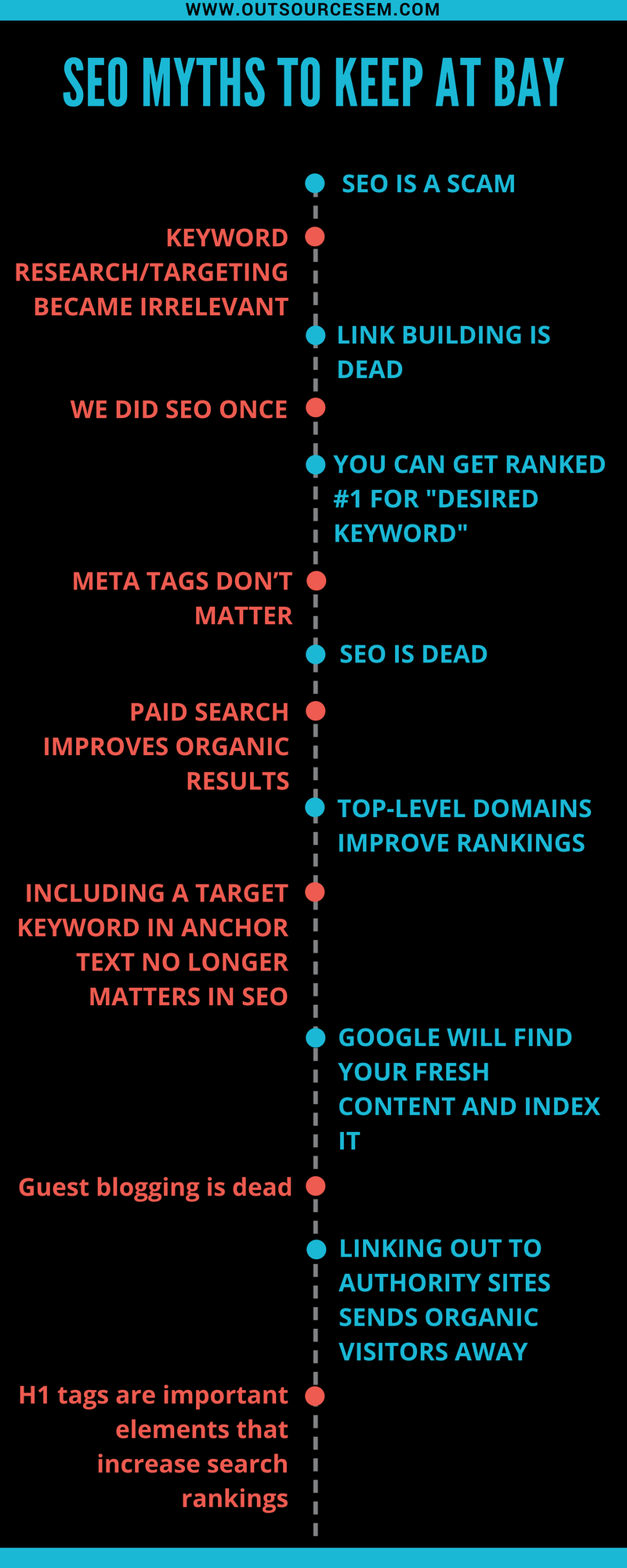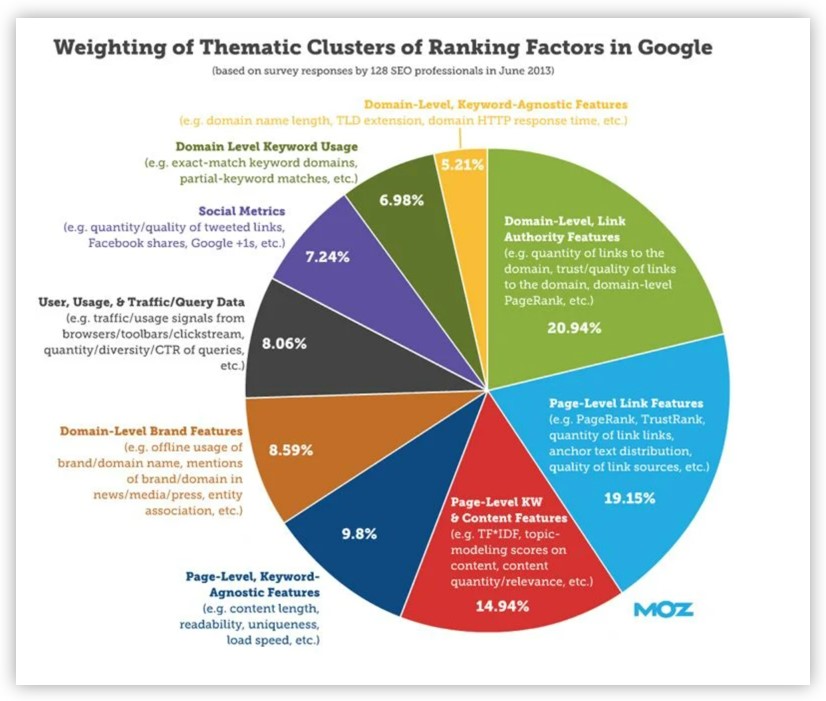When people don’t have any idea about what they are talking and start to make stories they become myths. Their intension might have been good, may be to help others but with incomplete knowledge this becomes an issue. Myths, fable or legend are all made by people mostly on hearsay and some with little knowledge of search engine optimization (SEO).
In this article, we will deal with these myths that I have come across related to SEO, some of them you may find funny, few of them interesting and some even true.

SEO is a Scam: Oh Yeah! I have heard this a lot, especially people saying that SEO is fluke, it doesn’t work always. Well they will also say we paid $99/month and got nothing. In such cases, it really does looks like a scam. SEO is expensive deal, it takes lot of persistent effort and its resource intensive. We need to understand that at such low-cost, SEO for a website is not possible ethically.
Keyword research/targeting became irrelevant: A lot has been said about keyword targeting recently, speakers and people who know SEO ended up stating this as facts. After Google hummingbird update keyword targeting became irrelevant, which is so not true. The fact that webpages with keywords still end up showing as top search results, tell us otherwise. According to Matt Cutts what did happen was a total revamp affecting 90% of searches.

In the above graph, Rand Fishkin suggests that almost 15% weightage in ranking is given to keyword targeting based content. It’s wrong to suggest that keyword targeting is dead because the premise of search engine results is based on query (which are in fact keywords).
Link building is dead: Time and again we have heard that link building is dead and still we find that approx. 20% weightage is given to page level link features. Link building is not bad till you are doing it in the white hat method. What Google wants is that you should have content which is not only unique and relevant but also has great value.
We did SEO once: SEO is a continuous process, we need to understand a few things which are crucial.
• There are new pages getting published all the time – new information
• Content gets obsolete/outdated
• Competition keeps striving to get ahead
• New opportunities or products that you may have recently launched for which SEO is not done on your website
• New algorithmic changes and updates by Search Engines
You can get ranked #1 for "desired keyword": No, you can’t, if someone tells you they can get you the number one place, they are lying. There is nothing like guarantee in SEO and that to for number one rank. Also, what we need to understand is it’s not important to rank for a word which has high traffic, but to rank for keywords that have relevance to the information present on your website.
Meta tags don’t matter: well they do! So, there are mainly three types of meta tags – title, description and keyword. Now all these form part of the head section of the HTML, while title is a necessary element of the page, description and keyword tags are optional. If required Google can show data from the content in the page. Though Matt Cutts said that Google doesn’t use meta data for ranking but it’s still important to have it. Keyword tag lets the search engines know what the page is all about.
SEO is dead: We hear this a lot recently. As Google has been making updates to algorithm it has become impossible for people to do SEO and rank a website. This is a misconception, SEO was never intended to be done just to rank a website, the real purpose behind Googles updates are that the users should get good relevant information which they are looking for, in short - a great user experience. SEO should always be worked towards value creation for the online audience. The websites who follow white hat methods and see that they are creating value, still get ranked by Google.
Paid search improves organic results: Lots of my clients have asked me this question and I keep clarifying them, there is no relation whatsoever between SEO and Paid Search accept they both appear on the same page. Google doesn’t charge anything to get your site in top organic results.
Top-level domains improve rankings: Most of us are aware of certain TLDs like .com, .net, .org, .info but there are also new generic top level domains like, .guru, .consultant. The misconception that the TLD will have effect over the search rankings is wrong. As you are aware more than 80% of the domains showing in the SERP is .com related, the top-level domain name doesn’t have that much of impact. The only place where they get advantage is when a search user looks for local information like in UK, .co.uk will get advantage over .com. As Google very well understands/considers that .com is mostly for global audience and local information is best suited for local regional extensions.
Including a target keyword in anchor text no longer matters in SEO: No, it still matters. Sure, using excessive keywords or over optimization can harm your website ranks and even get you penalized for doing it. What we need to keep in mind is that keyword anchors are important part of the content, internal or external. Like if I am writing a blog about SEO Reseller my anchor will be SEO Reseller and the Services We Provide. As the content is topic driven which may be a keyword still it should be mentioned, as some of the things are consequential and cannot be left out.
Google will find your fresh content and index it: Now here you need to go an extra mile. Google will find out may be in couple of days, a week or in couple of weeks depending on how frequently in the past you have been putting in fresh content. Here you need to do the extra effort, if you have a WordPress website you can easily install a xml sitemap generator or if you have a static site you can go to Search Console/ Webmaster Tools and Crawl > Fetch as Google > submit the new page for indexing. You can also submit an updated sitemap manually if you wish in the sitemap section.
Guest blogging is dead: Does that sound somewhat true? After all Matt Cutts mentioned in his blog “The decay and fall of guest blogging for SEO”. So, is it true that guest blogging is dead? No, I don’t think so guest blogging is very much relevant and still people are doing it. What Matt Cutts clarified later in his own word, “There are still many good reasons to do some guest blogging (exposure, branding, increased reach, community, etc.). Those reasons existed way before Google and they’ll continue into the future. And there are absolutely some fantastic, high-quality guest bloggers out there.” He further added “I just want to highlight that a bunch of low-quality or spam sites have latched on to “guest blogging” as their link-building strategy, and we see a lot more spammy attempts to do guest blogging.” What he actually meant was doing guest blogging through crappy content is wrong and whoever is doing it should stop or else face penalty.
Linking out to authority sites sends organic visitors away: Yes and No, actually it totally depends on few factors. Let’s consider you are writing a blog, you do research and find information, now while stating this information in the blog if you also mention the source it creates a better user experience and a verified reference for your reader. Even though you have provided links to these authority websites still the visitor will stick to your blog and read if your content is well researched and informative. The link you have provided may have information on certain section of the topic you are discussing. So, overall the engagement with your audience will depend upon your informative content. For example, if you consider Wikipedia there are several links in the “Notes” section and people will go and check them but still the informative content of Wikipedia keeps the visitor engaged. It is also to be noted that giving relevant links to authority websites does help’s you in boosting your websites rankings.
H1 tags are important elements that increase search rankings: Yes, they use to be for sure – in the past maybe? So, check this blog The Biggest SEO Mistakes SEOmoz Has Ever Made and you will understand how wrong was Moz in suggesting keywords in H1 tags. The fact that Google is smart to understand what is important and what is not which leads us to one question, how valuable is our content? This would actually determine the importance of page rather than use of keywords in H1.
Conclusion:
Don’t get stuck with your optimization, read more to keep yourself updated because only knowledge can help you differentiate between a myth from a fact.
#Ref:
- 10 SEO Myths that Friggin' Tick Me Off
- 17 SEO Myths That You Should Never Follow
